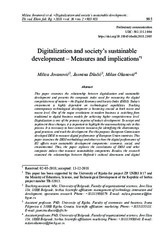Please use this identifier to cite or link to this item:
https://rfos.fon.bg.ac.rs/handle/123456789/1792Full metadata record
| DC Field | Value | Language |
|---|---|---|
| dc.creator | Jovanović, Milica | |
| dc.creator | Dlačić, Jasmina | |
| dc.creator | Okanović, Milan | |
| dc.date.accessioned | 2023-05-12T11:14:26Z | - |
| dc.date.available | 2023-05-12T11:14:26Z | - |
| dc.date.issued | 2018 | |
| dc.identifier.issn | 1331-8004 | |
| dc.identifier.uri | https://rfos.fon.bg.ac.rs/handle/123456789/1792 | - |
| dc.description.abstract | This paper examines the relationship between digitalization and sustainable development and presents the composite index used for measuring the digital competitiveness of nations - the Digital Economy and Society Index (DESI). Today's environment is highly dependent on technological capabilities. Tracking contemporary technological development is becoming crucial at both micro and macro level. One of the major revolutions in modern business is switching from traditional to digital business models for achieving higher competitiveness level. Digitalization is one of the primary impetus of today's development. To accept and implement these changes, it is important to highlight the macromarketing role in this process. It is necessary to have concrete measures for identifying the shortcomings, good practices, and track the development. For this purpose, European Commission developed DESI to measure digital performance of European Union countries. This paper examines the DESI methodology and observes how the digital performance of EU affects main sustainable development components: economic, social, and environmental. Thus, the paper explores the correlations of DESI and other composite indices that measure sustainability components. Besides, the research examined the relationships between Hofstede's cultural dimensions and digital performance. The paper highlights the importance of digitalization as another crucial component of society's sustainable development. | en |
| dc.publisher | Univ Rijeka, Fac Ecomomics, Rijeka | |
| dc.relation | University of Rijeka [ZP UNIRI 9/17] | |
| dc.relation | info:eu-repo/grantAgreement/MESTD/Technological Development (TD or TR)/32013/RS// | |
| dc.rights | openAccess | |
| dc.rights.uri | https://creativecommons.org/licenses/by-nc-nd/4.0/ | |
| dc.source | Zbornik radova Ekonomskog fakulteta u Rijeci / Proceedings of Rijeka Faculty of Economics | |
| dc.subject | sustainable development | en |
| dc.subject | society | en |
| dc.subject | performance indicators | en |
| dc.subject | macromarketing | en |
| dc.subject | digitalization | en |
| dc.title | Digitalization and society's sustainable development - Measures and implications | en |
| dc.type | article | |
| dc.rights.license | BY-NC-ND | |
| dc.citation.epage | 928 | |
| dc.citation.issue | 2 | |
| dc.citation.other | 36(2): 905-928 | |
| dc.citation.rank | M23 | |
| dc.citation.spage | 905 | |
| dc.citation.volume | 36 | |
| dc.identifier.doi | 10.18045/zbefri.2018.2.905 | |
| dc.identifier.fulltext | http://prototype2.rcub.bg.ac.rs/bitstream/id/478/1788.pdf | |
| dc.identifier.rcub | conv_2133 | |
| dc.identifier.scopus | 2-s2.0-85059299651 | |
| dc.identifier.wos | 000454542100020 | |
| dc.type.version | publishedVersion | |
| item.cerifentitytype | Publications | - |
| item.fulltext | With Fulltext | - |
| item.grantfulltext | open | - |
| item.openairecristype | http://purl.org/coar/resource_type/c_18cf | - |
| item.openairetype | article | - |
| Appears in Collections: | Radovi istraživača / Researchers’ publications | |
SCOPUSTM
Citations
95
checked on Nov 17, 2025
Page view(s)
6
checked on Dec 28, 2025
Download(s)
4
checked on Dec 28, 2025
Google ScholarTM
Check
Altmetric
This item is licensed under a Creative Commons License


